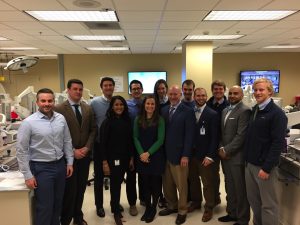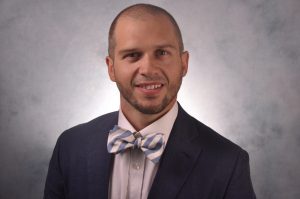
Media Contact: Jamie Williams, jamie.williams@unchealth.unc.edu, 984-974-1149
Residency interviews happen across a desk or conference table. Residency training does not. That disconnect motivated Adam Zanation, MD, Vice Chair of Academic Affairs in the Department of Otolaryngology/Head and Neck Surgery, to rethink the way the Otolaryngology department conducts the ENT residency application process.
For the past two years, Otolaryngology/Head and Neck Surgery, has split their residency interviews in half. They still do conduct traditional sit down interviews, but prospective residents also participate in several stations of surgical simulation. Lessons learned from this new method of interviewing were recently published in The Laryngoscope. Though it has been done in small stations in other specialties, Zanation said UNC is the first Department of Otolaryngology/Head and Neck Surgery to conduct interviews in this way with this level of breadth of simulation.

“Traditionally we have interviewed people in a way that does not allow them to experience what we are like as technical teachers,” Zanation said. “We wanted our applicants to have a more robust experience and leave with a better understanding of how we are going to work together when we are in the operating room.”
To carry out the project, nearly the entire department had to get involved. Applicants moved through simulations involving each of the department’s subspecialties. They needed to be able to understand the simulations easily and complete them quickly. The simulations also needed to be appropriate to the skill level of the interviewees. Zanation emphasizes that applicants were not evaluated based on skill, but rather communication, composure, the ability to take instruction, and the ability to provide feedback and ask questions.
“I’m not looking to see if you’re holding your instrument exactly right, I have five years to teach you that,” Zanation said. “What I need to understand is how you respond to being given complicated instructions and whether or not you are willing to ask the questions necessary to understand exactly what needs to be done.”
Zanation said other programs have been slow to adopt such a model due to the perceived stress it would add to the interview process. He says UNC mitigated that by being transparent with interviewees about the process and what would be expected of them. Through two years, Zanation said there have been zero reports of the exercise producing excess stress and a nearly universally positive response.
He said the benefits of this style of interviewing, though, are immense. When it comes down to it, there is little academic difference between the students who come to interview for UNC’s residency program. Success depends on an intangible: “fit.”
“In patient care, the resident and the attending are working shoulder to shoulder, so it’s very important that program faculty and the potential residents get a feel for how they might work together,” Zanation said. “I really think finding a great fit can improve patient care, as well as quality of life for the attendings and residents. Education is such an important mission here at UNC and within the ENT Department, improving our selection processes, mentorship models and educational methods should be studies and we are helping lead in this.”
Maheer Masood is a first author on the paper and a fourth-year medical student. He’ll be starting his residency interviews in a few months and brought that unique perspective to the project.
“From a medical student perspective, experiencing how a program teaches and getting a feel for the faculty-resident relationship is a great addition to the process,” Masood said. “No matter the ranking of the program, it has to be somewhere you can see yourself thriving for the next five or so years of your life and career.”
Co-authors for this project are Medical Students Maheer Masood and Elizabeth Stephenson, UNC Otolaryngology Residents Dr. Douglas Farquhar, Dr. Zainab Farzal and Dr. Parth Shah, and UNC Faculty Dr. Robert Buckmire, Dr. Wade McClain, Dr. Madison Clark, Dr. Brian Thorp, Dr. Adam Kimple, Dr. Charles Ebert, Dr. Lauren Kilpatrick, Dr. Samip Patel and Dr. Rupali Shah.